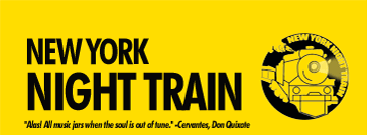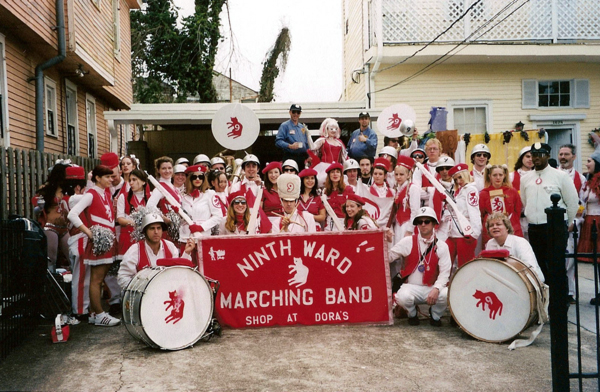|
|
|
||
| home | table of contents |feature | record reviews | live shows | news | events |archive | record label | links | contact | ||
INTRODUCTION
TO
The big secret has always been that one of the finest underground music scenes in the United States resides in New Orleans' Ninth Ward. Because they tend to care more about making music, having a party, and entertaining their friends than trying to push themselves or their music on the outside world, they’ve always been somewhat isolated. The most notable exception is Mr Quintron and Miss Pussycat – who have been steadily cultivating a substantial fan base with over a decade of constant recording and touring. And also, in the last year alone I've seen at least half a dozen Ninth Ward bands in New York. While this phenomenon was underway before Katrina, the exile scattered the bees and their music around the country. Despite the recent activity, the indie community has given these artists (sans Quintron) very little coverage and hasn't sufficiently addressed the question of what Katrina means for this colorful, uncompromising, and tightly-knit music scene. A number of the Ninth's finest bands broke up due to the scattering of members and quite a few entire bands relocated. These problems can be added to the obvious local concerns that you hear about in the everyday media. I decided to get in touch with my few friends left in New Orleans to try to get a line on their experiences during the hurricane and in exile– as well as their opinions of what this all means for their city, their neighborhood, and, most of all their music. While this is primarily a New York music magazine, I've chosen to address the Ninth Ward underground music scene for a few reasons. First, like quite a few other folks that I know, the New Orleans Ninth Ward music scene has been an important part of my cultural experience as both a person and a musician - and a substantial influence to boot. Secondly, since all of the gang's been scattered around the country, New York has had the good fortune of hosting no small number of New Orleans musicians - though not as many as in Texas and California. Third, a small but significat portion of New York's underground is from either New Orleans or its sister scenes all the way up to Memphis - who share a common subcultural experience (seeing the same bands, people moving back-and-forth, etc.). And finally, the unfortunate events that have befallen these musicians are the problems of the overall underground community in general - and, though we were a bit later than mainstream folks like say, Motley Cru or Sean Penn, New York's larege assortment of subterranean scenes have put on no shortage of benefits and other attempts to help in the last few months. Though I’ve been outside of the New Orleans loop for many years, the Ninth Ward, its residents, its parties, and its music are forever present in my thoughts and in my heart. So when Katrina went down, one of the big questions that I had that wasn’t really answered is, "What will happen to this little piece of the subcultural map that means so much to me?" I had seen a fair amount of mass media coverage of all of the great jazz, R&B, funk, etc. - but the underground music media has yet to sufficiently address their New Orleans brethren. Overall I was sympathetic to the plight of the Ninth Ward musicians but not too worried because I knew that, as long as these people were alive, everything I like about the place would live on – they’re not weaklings by any stretch of the imagination. And they're in the process of proving it - Mardi Gras is on, Quintron's Ninth Ward Marching Band are currently practicing to hit the streets, mainstays like MC Trachiotomy are playing shows, there're a million parties, and there's quite a bit going on at The Circle Bar and other spots. So this small neighborhood subculture is soldiering on and taking it from where it left off - maybe even with more of a sense of purpose than before. As with the last issue, I’ve decided that this story should come from the horse’s mouth. While the list of musicians covered here by no means reflect the Ninth Ward underground as a whole, it is a random sampling: some of whom dug in for the hurricane and others who evacuated, some who’ve decided to stick around, and others who’re starting over elsewhere, some whose bands broke up, and others who are still together, some who had everything destroyed, and others whose lives and possessions remained intact, some who fear that the New Orleans they know and love will never return, and others who guarantee that it's already coming back. They discuss the New Orleans “police,” damage, rescuing friends and neighbors, sneaking in and out of town, surveying damage, insurance, charities, reception from out-of-town communities, and a number of other topics. I hope you make it through because there’s a variety of viewpoints from a wide array of musicians – and it’s one heck of an entertaining read to boot. Use this not only to learn about what happened from the people who lived it, but also to initiate your own New Orleans underground music exploration. Again, there's much more out there than what you see here... And get a last-minute ticket down to Mardi Gras – this year promises to be one of the best. I’m going to play a couple of shows down there this coming weekend and will hopefully get more of the scoop from the locals – and when I return I’ll be able to fill you in on what goes on - with more songs, stories, and pictures. Until then, enjoy, open your ears, and don’t forget to visit the charities section if you have a little extra cash and want to help out. Finally, I'd like to give a shout out to the musicians who shared their stories, sounds, and photos with us: E.P., John Henry, Kid Twist, Lefty Parker, MC Trachiotomy, Miss O, and Ratty Scurvics - may the world be yr collective dawg. Au Revior Mes
Amis,
Ninth Ward Underground feature home | New York Night Train home
© New York Night Train , 2006
|


